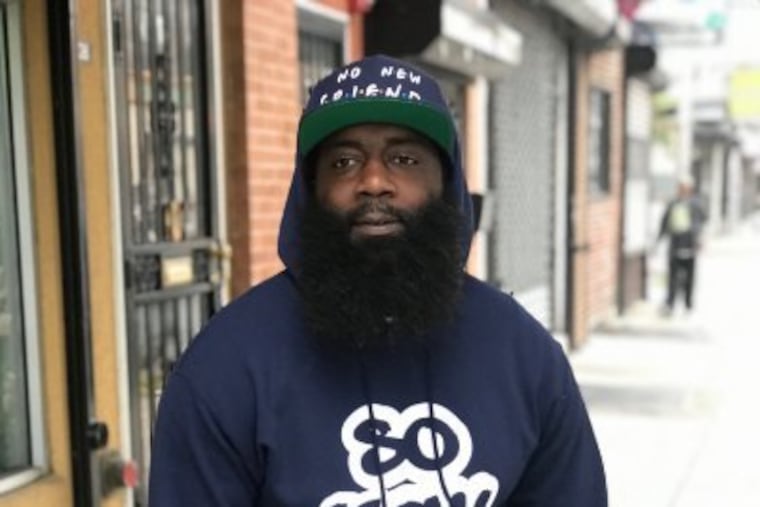Rapper Dark Lo pleads guilty to threatening witness who helped put N. Philly rap star AR-Ab in prison
His admission of guilt is the latest development in a legal saga that has decimated the rap group Original Block Hustlaz while enthralling its legions of fans with every twist and turn.

Ten days after federal authorities charged nine rising rap stars and associates from the North Philadelphia record label Original Block Hustlaz in a sprawling 2018 drug conspiracy case, Charles “Dark Lo” Salley — one of the group’s few standouts to avoid indictment — released a new track dismissing the charges.
Titled “Allegations,” its hard-bitten, street-honed lyrics blamed the case on “a rat” who must have informed on the group and its founder, Abdul Ibrahim West, better known by his rap name, AR-Ab. Salley warned whoever the informant was that they would be hunted down and shot.
On Monday, Salley, 39, pleaded guilty to one count of witness intimidation stemming from threats he subsequently made once the informant’s identity was revealed.
His admission of guilt is the latest development in a legal saga that has decimated his once up-and-coming North Philadelphia rap group while enthralling its legion of online fans with every soap operatic twist and turn.
West, the cofounder of the Original Block Hustlaz (OBH) label and by far its most well-known rapper, is awaiting a sentencing hearing that could send him to prison for decades after he was convicted in 2019 for turning the label into a large-scale North Philly drug operation that has been linked to at least two killings.
» READ MORE: Philly rap star AR-Ab is convicted of running drug ring implicated in murders, faces at least 15 years in prison
Salley, a fixture in the courtroom gallery during West’s trial and a popular rapper in his own right, was arrested during the proceedings and now faces up to nine years in prison under terms of the deal he struck with prosecutors.
The near certainty both men now face prolonged periods of incarceration has thrown their future music careers into doubt, but it hasn’t appeared to squash their followings.
The cases against them have inspired new rap tracks and music videos. Court filings have become the subject of social media beefs and inspired hashtags calling for their release. And each new development seems to spawn a plethora of YouTube livestream videos from their dedicated fan base — including one West called in to late last year from prison to share that he’d been stabbed by another inmate.
Federal authorities have used it all, in real time, in building their cases against the men. They put West’s music under a microscope at his 2019 trial, saying his lyrics and social media persona were more than just hypermasculine boasting of street-honed toughness: They were confessions to real crimes.
In Salley’s case, prosecutors cited the lyrics in his “Allegations” track, released after West’s arrest, as the first in a series of threats he made against a star government witness.
“His lyrics promote gun violence and his music videos depict images of drug dealing and weapons possession,” Assistant U.S. Attorney Justin Ashenfelter wrote in a 2019 court filing. “Plainly, he is a danger to the community and he enjoys that image, using it as a platform to sell his music.”
But the specific charge to which Salley pleaded guilty Monday grew out of two letters he wrote to the man — Dontez “Taz” Stewart — an OBH groupie Salley had brought into West’s inner circle after meeting him in a previous stint in state prison in 2009.
Stewart had been charged alongside the other members of OBH in the federal case in 2018 but ultimately pleaded guilty and agreed to testify against the others. At the time, he was facing a murder charge in state court for killing one of West’s drug-world rivals — a crime federal prosecutors maintained that West had boasted about in a 2017 music video.
But days before Stewart was set to testify, he received a letter addressed from “Ron Harvey,” an alias Salley has used in his music career and a reference to one of the founding members of the Philadelphia Black Mafia.
The missive opened with the greeting “Wassup Stewart Little” — a phrase prosecutors interpreted as a tortured allusion to the talking mouse protagonist of the 1945 children’s classic Stuart Little and slang used to refer to government cooperators as “rats.” It also included warnings that he might be “stabbed up” in prison and that the mother of his children might be raped if Stewart went through with his testimony.
When agents confronted Salley about the letter, he admitted to writing it but insisted he did not mean it in a threatening way. He explained he was dismayed to learn that Stewart, whom he considered his protégé, had betrayed him, West, and the other OBH members and simply wanted to warn him of the consequences of that decision.
“I don’t see how that’s threats,” Salley told agents, according to a transcript of his 2019 interview. “If I didn’t know him, that’s threats. … But he was under me, so I felt as though I could say that to him.”
Salley’s attorney, Jonathan McDonald, did not immediately return calls for comment Tuesday to discuss what motivated his client’s change of heart and decision to plead guilty.
In the meantime, Salley has been busy writing and producing a steady stream of new music to last his fans through his incarceration. While out on bail, he has written and produced four new albums, his lawyer said in recent court filings.
U.S. District Judge Mark A. Kearney gave him permission Monday to leave house arrest to shoot music videos to promote them.